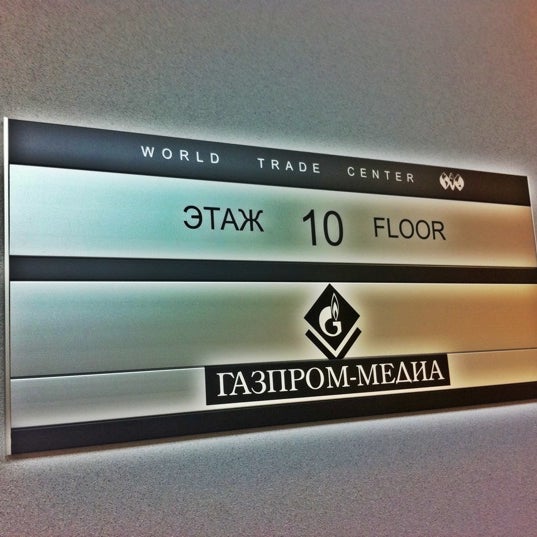Welcome to our new column, Russia Update, where we will be closely following day-to-day developments in Russia, including the Russian government’s foreign and domestic policies.
A mysterious toxic gas spreads across Moscow, and the Kremlin’s promise to reorganize the Russian media landscape is several steps closer to completion.
The independent station TV Rain has been trying to get to the bottom of the story of the gas leak in Moscow all day — and authorities have changed the story a number of times.
Translation: “They say it smells of sulfur here alway, it doesn’t seem like an accident.” Our correspondent Mariya Borzunova is at the oil refinery.
Meanwhile, Mosekomonitoring, the pollution monitoring agency has changed its earlier statements about the higher concentration of toxic chemicals in the air.
The agency now says there is no styrene in the air, as reported earlier, and that it recorded a higher percentage of hydrogen sulfide in the area in different locations around Moscow than usual, with the highest concentrated around 3 pm which has since reduced in half.
This morning Mosekomonitoring said it had taken a sample of air in Kozhukhovo, at the eastern most city limits, and found twice as much styrene in the air as is the norm.
Translation: “Ministry of Environment: the leak of hydrogen sulfide is related to the oil refining process, gas generation or the work of the electrical grid” — TASS. How many other versions of the story will there be?
Translation: The Department of Natural Resources has cancelled a press conference at 17:30, announcing that they will not talk about hydrogen sulfide. Classy!
Muscovites were trying to cope with their customary resigned sarcasm, humor and poetry:
Translation: A friend writes that it stinks in Izmailovo as well, although children are running a marathon on the street. Russia.
Translation: are there little gas masks for kittens?
Translation: Everybody hold their breath.
Translation: Rosgidromet [Russian Weather Service] “It will be rain tomorrow – and everything will be fine.” WELL OK
Translation:
Moscow!
My head – ow!
Moscow!
Escape the gas – how?
Moscow!
Stinking hydrogen sulfide spreads through the city.
Ekho Moskvy‘s editor-in-chief tweeted a check-in from Swarmapp that he had gone to Gazprom Media, the owner of
Ekho Moskvy, but didn’t have any further news yet on either the smell in
Moscow or the situation with his own radio, owned by the state gas company.
RT.com, the Kremlin’s propaganda outlet, launched a poster campaign this summer.
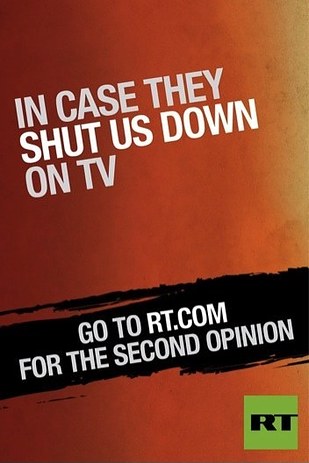
It appeared on bus shelters in New York City and other public places and then was extended to Washington, DC and London.
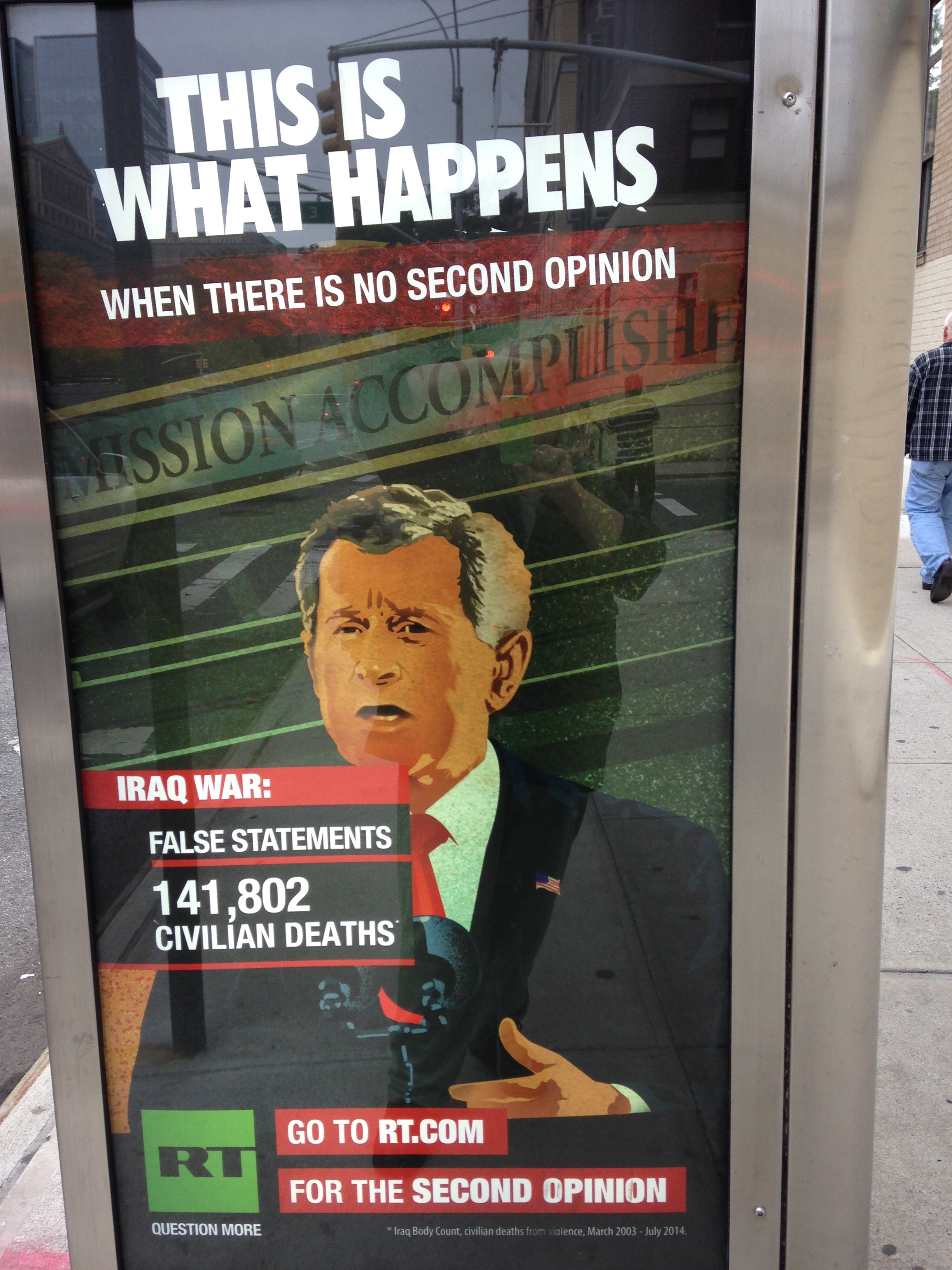
Photo by Catherine A. Fitzpatrick
As the Kremlin propaganda outlets try to create a climate of pseudo-paranoia and persecution abroad, the Kremlin itself is taking actual news organizations off the air in Russia.
Today CNN announced that it was forced to cease broadcasting in Russia due to a new media law restricting foreign investment in Russian media.
So we had an idea for a campaign for CNN — they could put it on Moscow bus shelters:
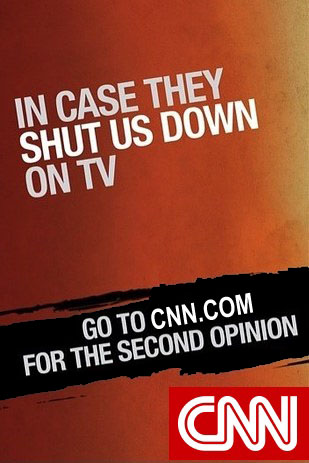
Mash-up by Michael Weiss
Catherine A. Fitzpatrick and Michael Weiss
As we reported earlier, CNN has decided to end its broadcasts in Russia.
CNN has since released a statement in English which confirms that
Russia’s repressive media laws were the primary motivator for the
decision. Mashable’s Christopher Miller reports:
“Turner
International is assessing its distribution options for CNN in Russia
in light of recent changes in Russian media legislation,” the statement
said. “We are bringing our existing distribution relationships to an end
while we do that. We hope to re-enter the market in due course, and
will notify our partners of any update about resuming these services.
The CNN Moscow bureau operation remains unaffected.”Denis
Rychka, head of media relations for Akado Telecom, which broadcasts CNN,
told Mashable by email that his company had received a “letter signed
by vice president of legal affairs [of] Turner Broadcasting System
Europe Eleonora Brown,” outlining the decision to cease operations. He
did not elaborate on the specifics of the letter. (The independent
Russian news outlet Vedemosti reported that another Russian distributer,
VimpelCom, said it had received a similar letter from Turner
Broadcasting.)
As we’ve been reporting, it’s not just
CNN or even foreign-owned media outlets which are under siege, but the
entire Russian media landscape. One of the media outlets feeling the most pressure is Ekho Moskvy. On Friday we reported
that one of their journalists, Aleksandr Plyushchev, was dismissed
after he sent a questionable tweet about Putin’s chief of staff. But he
was already under investigation by Russia’s
state censor, Roskomnadzor, due to charges of “extremism” relating to
his reporting on the situation at Donetsk International Airport in
Ukraine.
In our Window on Eurasia column, Paul Goble write
that it’s time for the United States to respond to the pressure on Ekho
Moskvy by relaunching its own radio news programs:
Since reports circulated that Igor Bezler, the notorious Russian army major-general who led the Russian-backed separatists in Gorlovka, was assassinated by Russian Federation agents, there has been massive speculation about what happened to him.
Immediately, his supporters said he was not dead but just in Moscow, although he had resigned from his command and would not return to the so-called “Donetsk People’s Republic”.
The Crimean Russian blogger Colonel Cassad (Boriz Rozhin, editor of Golos Sevastopolya) printed the stories that Bezler is still alive, admitted that a test will be whether “Bes” (“Demon”), as he was nick-named, will show up for an upcoming DPR awards ceremony.
The awards have generated a lot of scandal and in-fighting among the separatists. Letters went out recently to some commanders and even former commanders (Strelkov was dismissed in August), saying they were being issued medals with the title “Hero of the DPR.”
But then Strelkov said he never got the letter, and that he wouldn’t accept an award from Aleksandr Zakharchenko, prime minister of the DPR, in any event.
“I would not accept any awards from a man who has publicly offended me,” he wrote on his “secret forum” (an Internet forum on historical war re-enactments which is hidden from view, but often re-tweeted).
Strelkov said that the title of “Hero of the DPR” would only be given to Bezler and Aleksandr Boroday, the first prime minister of the DPR, and not to him.
“Hero of the Soviet Union” was the USSR’s highest award, and the tradition was continued by the Russian Federation.
Yet a copy of the letter over Zakharchenko’s signature — but without the DPR seal — was published by Colonel Cassad earlier this week from the official DPR website among announcements of decrees.
It informed Strelkov and Boroday of “the state award of the Donetsk People’s Republic” and the “Gold Star of the Hero” for “great contribution in the formation, establishment and defense of the Donetsk People’s Republic and for courage and heroism displayed”

The award letter was also covered by the Russian state news agency RIA Novosti which added that former DPR vice premier Vladimir Antyufeyev would receive the title of “Honorary Citizen of DPR.”
A pro-separatist news site, pravodryb.info, says that they published the news of the award after seeing it confirmed on the official DPR Today site and RIA Novosti.
But after contacting Strelkov themselves, they also heard from another participant in the “secret forum” named Plokhoi Soldat (“Bad Soldier”) who said that the decree had attachments which he had seen, and the award citations in fact didn’t include Strelkov among them.
Pravdoryb claimed that Strelkov’s name was missing and others saw that it was gone, but now we see it back up again with today’s date as of this writing:
This link has Strelkov’s name in the notice and a further link to the “Documents” section of the site.
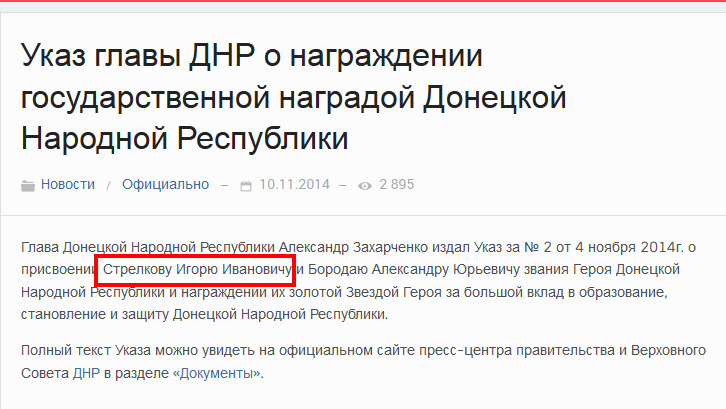
Colonel Cassad says that Zakharchenko seems to have disappeared after he was “elected” on 2 November, and wasn’t currently present in Donetsk such as to have signed the letters. He commented, “It will be interesting to see if Bezler shows up for the awards.”
The ceremony does not yet appear to have been announced but is expected soon.
Catherine A. Fitzpatrick
LifeNews published an article claiming that anti-corruption blogger Alexey Navalny was funded by the Kremlin — then removed the piece, Lenta.ru reported.
Interestingly, the Kremlin refuted the story, calling it “complete nonsense and a chase after ratings, with all respect for LifeNews,” said a source. Even so, a representative of the presidential administration promised to look into the claims.
Several hours later, the article was put back online at another link on the LifeNews website, a TV and Internet news company that is close to law-enforcement and intelligence agencies in Russia.
Anastisiya Kashevarova, an Izvestiya journalist who commented on the affair, posted a message on her Facebook page that she feared she would be fired over the incident, although evidently Aram Gabrelyanov, head of LifeNews, was able to successfully defend her.
The article claimed that since 2012, Aleksandrina Marko, the common-law wife of Vladimir Ashurkov, the executive director of Navalny’s Anti-Corruption Fund, had been funding his projects at the Anti-Corruption Fund through Byuro-17, a company that had earned 100 million rubles ($2,191,181) in state tenders. Another company called Slava, also close to Ashurkov, earned about 30 million rubles ($657,426) in state tenders.
In July of this year, Russian federal authorities put out a “man wanted” notice for Ashukrov, who had already fled to England and requested political asylum by that time.
Navalny, who made his reputation exposing the corruption of high officials in Russia, is now has been targeted with a number of criminal cases widely believed to have been fabricated in retaliation for his crusades. He is currently under house arrest and banned from the Internet in a case involving the French company Yves Rocher.
Last week, Christian Melnik, financial director of the cosmetics company, testified in a Moscow court that his company had no claims against Navalny or his brother.
Russian authorities had tried to create a case against the Navalnys on claims of fraud of up to 26 million rubles (about $575,500) supposedly committed against the French company which its executives themselves did not confirm. The brothers were further charged with money-laundering.
Navalny has also faced a number of other cases, from a suspended sentence of 5 years of prison for allegedly embezzling profits from a lumber company, to stealing a sketch made by a street artist and posted on a wall. Recently, he was permitted to give interviews to a number of Russian media outlets, in which he expressed his controversial wish to keep Crimea as part of Russia.
Catherine A. Fitzpatrick
Turner Broadcasting System Europe, Ltd., a subsidiary of Time Warner, which owns CNN, informed cable operators in a letter obtained by Vedomosti that it will discontinue broadcasts. Cable operators Vymplekom and Akado confirmed they had received the letter. No reason was stated for the discontinuation of CNN in Russia.
CNN, founded by Ted Turner in 1983, was one of the first 24/7 TV stations which grew particularly popular when it covered the suppression of the August 1991 coup attempt against then-president Mikhail Gorbachev and other worldwide events. For a time, CNN was the go-to news source for governments and other news companies everywhere but has experienced a decline in recent years with the appearance of cable competitors and the Internet.
In 2009, Roskomnadzor, the Russian state media agency that acts as a censor, began to make harsh demands on foreign cable TV, placing new requirements for licensing and threatening that the stations would be shut off if they were not met. The review of CNN’s application dragged on for some time and in fact had still not been received at the time of today’s announcement. The station operated with a letter saying it was “in the process of receiving” the license.
One source said that CNN may have decided to end its Russian version because ad sales were poor in Russia, although there was no confirmation of this claim from Roskomnadzor, said Vedomosti.
In 2010, Russia passed a law barring the investment of foreign radio and television companies in Russia over 50%. The US-funded Radio Liberty ceased broadcasting in 2012. Earlier, Voice of America had moved to an Internet version in 2008 then later closed its office last year. In 2011, BBC’s Russian Service and Germany’s Deutsche Welle also ceased broadcasting.
In September 2014, the State Duma, or parliament, passed an even harsher law restricting foreign capital to 20%, which affected most foreign media operating in Russia.
Vedomosti itself, as a 100% foreign-owned joint venture of the Financial Times, Wall Street Journal and Sanoma Independent Media, is affected under the law.
Sanoma had begun looking for a buyer already in July, then Vedomosti was reportedly sold before the law passed — to unknown buyers in Russia.
Catherine A. Fitzpatrick
According to information provided to the Energy Ministry’s situation analysis center by Gazprom Neft, Russia’s main state oil company, the plant is working fine, says a spokesman.
Earlier the Emergencies Ministry said the toxic gas spreading over some districts of Moscow with the smell of sulfur was caused by a “malfunction” at the NPZ. Yury Akimov, first deputy of the Emergencies Ministry’s Moscow department, said there was a break-down in the system for processing hydrogen sulphide at the plant.
Meanwhile, Gazprom Neft, the owner of NPZ, said no such thing happened (translation by The Interpreter):
The plant is working in its regular regimen, in accordance with the industrial plan. At the present time, according to information from the plant’s own laboratory, gas rescue unit and gas monitoring stations in the environmental protection zone of NPZ, there were no increases in the level of permissible concentrations of hydrogen sulphide recorded.
But residents of the central, east and southeast districts of Moscow continue to experience the bad smell and smog. And the air pollution monitoring agency Mosekomonitoring says that the concentration of hydrogen sulphide and styrene are higher than normal.
A toxic gas leak has spread through some districts of Moscow today, causing panic and anger among residents.
The cause was first rumored to be an explosion at an oil refinery, yopolis.ru and Ekho Moskvy reported.
But later Moscow’s Emergencies Ministry said that the cause was a “malfunction” at the oil refinery, not an explosion, Interfax reported at 18:22. Details on the exact nature of the incident were not available.
LifeNews reported that the concentration of hydrogen sulphide was 10 times the norm.

Photo by LifeNews
The oil refinery, located in Kapotna, said they had not experienced any leaks, Gazpromneft, the state oil and gas company, told Moscow City News Agency.
A spokesman said the oil refinery is in fact under repairs, and not
producing anything. They said it is monitored by Mosekomitgoring, which
reports on air pollution, and there are no problems on their end.
Meanwhile, Mosekomitoring has reported on its web site that the toxic substance styrene has exceeded 2.2 times the norm, and formaldehyde has reached 1.6 times the limit of concentration in the air per day.
Styrene
is regarded as a hazardous chemical which can irritate skin and eyes
and is possibly mutagenic and carcinogenic. People may experience
tearing, weakness, nausea and dizziness, and may also suffer gastrointestinal upset and effects on the central and peripheral nerve
system in higher doses.
People learned about the gas leak from Twitter before they did from Moscow authorities:
Translation: I looked at Twitter, they write that in Paveletsky District and Nagatino there is a sharp smell of hydrogen sulphide. Did something explode?
Translation: We’re sitting in our office on Nagatinskaya St, and I can confirm, it stinks.
People began circulating photos immediately of the grey smog over some areas of Moscow.
Moscow’s Weather Service told Interfax that due to weak winds and high humidity, it may take longer than usual for the toxic gas to dissipate.
Catherine A. Fitzpatrick
As if the Kremlin’s best known propaganda outlet RT.com were not enough, Russia is now launching the English-language Sputniknews.com, an Internet news site and network of radio stations. RIA Novosti, the once-respected Russian state news agency, is no longer publishing in English as a result of this reorganization.
Sputnik is the Russian word for both “fellow traveler” and “satellite,” and recalls the Cold War, when the Soviet Union beat the United States into outer space by launching the first artificial earth satellite.

Sputnik’s logo is reminiscent of the blocky Soviet constructivist design of the 1920s and is in the orange and black colors already familiar from the St. George ribbon worn by both Russian nationalists and Russian-backed separatists in southeastern Ukraine.
Moscow wants to increase its reach even deeper into the airwaves in foreign capitals in order to influence public opinion and then government policy.
as other state media, simultaneously ascribing to the US a global
influence it doesn’t have, and exonerating Russia of its interventions
in the world. To cite but two obvious examples, Russia has supplied
over a $1 billion in arms to the government of Bashar al Assad in Syria,
forcibly annexed the Crimea and even now has invaded Ukraine:
“There
are countries that impose their will on both the West and East,”
Director General of Rossiya Segodnya International Information Agency
Dmitry Kiselev said. “Wherever they intervene, bloodshed, civil wars and
color revolutions ensue. Entire countries fall apart. Iraq, Libya,
Georgia, Ukraine, Syria, to name just a few. Many people already
understand that the world doesn’t necessarily have to believe that the
actions of the United States work for everybody. Russia proposes a model
for the world that is based on respect for all of humanity. We believe
in a diverse, multicultural world, and we have many allies. To promote
this outlook our media group is launching a new global brand, Sputnik.
The growing global media empire signals Russia’s intention to once again take on the role of international ideological crusader and leader of the anti-American bloc of BRICS and other nations by positioning itself as an alternative social system. Yet while the Soviet-era propaganda stations espoused and spread communism with a definitive ideology, the new Russian brand is more a murky brew of Putinism, disinformation, and anti-Westernism.
The
page has a modern look with headlines and pictures arranged in a
checkerboard, but the kinds of stories featured are the old staple of
Russia propaganda familiar from RT.com, such as American conspiracy
theorist Paul Craig Roberts who
once served as Assistant Secretary of the Treasury in the Reagan
Administration and is notorious for his antisemitism, and publishes here a story on
American presidential crimes
Like RT.com and its heirs in the Soviet
press, Sputnik focuses on Western ills, like the US “War on Drugs” or
UK’s investment in Colombia development or US and Canadian government
surveillance as if they had no counterpart in Russia.
Last
week Rossiya Segodnya, which is the parent company for state news media
RT.com, RIA Novosti and now Sputnik opened RT.com bureaus in a number of
Western cities including London to increase the Russian invasion into
Internet and television. As a radio station, Sputnik will compete with liberal
radio stations like NPR in the US, which can be critical of Russia, and local FM
radio stations which people listen to on their morning commute.
“It is absolutely clear to us that trying to
broadcast in foreign languages and win over foreign audiences from
Moscow is not a productive approach,” Rossiya Segodnya Editor-in-Chief
Margarita Simonyan said. “Journalists who work in Moscow are not in a
position to understand local realities as well as the locals themselves.
Nor will they be able to invite local newsmakers and experts to their
studios.”
Russia extension of its reach comes even as it has
forced the US government station Voice of America to close in Moscow and
suppressed the domestic free press by censoring some sites such as Ekho
Moskvy, issuing warnings of criminal investigations on “extremism” and
forcing controversial reporters to resign.
And one of the outlets Sputnik is seeking to displace with brand confusion is Sputnik & Pogrom, a Russian ultranationalist web site which backed the “Novorossiya” movement whose leader, Yegor Prosvirin was recently summoned for interrogation and threatened with criminal charges for “extremism.”
Sputnik’s account on Twitter already has 56,000 followers as of this writing.
Catherine A. Fitzpatrick
